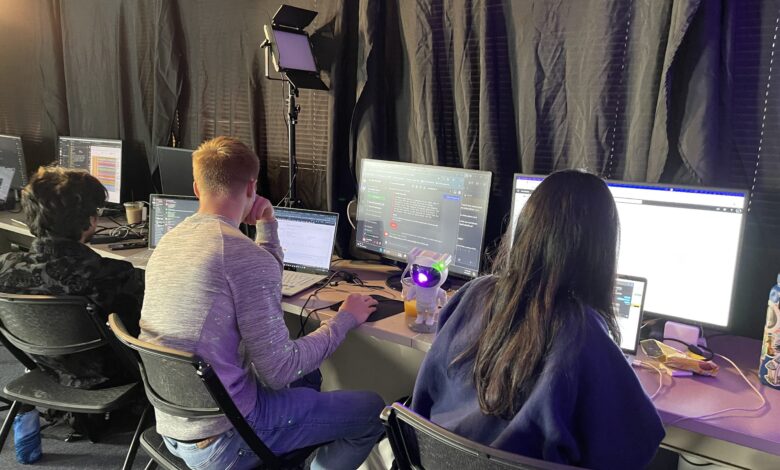California Cybersecurity Institute hosts “Space Grand Challenge” for middle and high school students

The California Cybersecurity Institute (CCI) hosted the seventh annual Space Grand Challenge, a virtual game-based cybersecurity competition created by Cal Poly students for middle and high school students from April 26 to 27.
First started in 2018, this year’s virtual competition saw a record number of 402 students registered from 13 different states and three countries, Operations Director Dustin DeDrum said. Though the competition used to be in-person for only local middle and high schools, the competition has since switched to a virtual format after the Covid-19 pandemic, DeDrum said.
This year’s competition theme was “Luna,” surrounding having 5G network on the moon. Participants were tasked to solve a compromised satellite company mystery using digital forensics, research, satellites and outer space knowledge, according to Technical Curriculum Director Henry Danielson.
“Cybersecurity and space are really a now problem,” Danielson said. “The idea of the Space Grand Challenge is [to] prepare [middle and high school students] so they are aware of how satellites work, how satellites could be compromised and [how] our space assets run our daily lives.”
With 402 registrations this year, the Cal Poly students had their hands full with communications through Discord, the Esports club broadcasting the competition and interviews with cybersecurity professionals.
The competition was broadcasted on Twitch, with Cal Poly students from the CCI creating the competition on specific teams: Amazon Web Services (AWS) and React programming, Unity team and Broadcast. The Unity team used the Unity game engine to create the cybersecurity game and create the lunar moon base and other challenge rooms for participants. The AWS team helped players troubleshoot the systems through Discord and aid in game movement, according to computer science sophomore Shafay Syed.
As a member of the AWS team, Syed said he found achievement by completing the competition programming and creating the game for younger students.
“We get a lot of thanks from the students and we get to interact with them,” Syed said. “It’s great to see these middle and high schoolers participating in new technology and [that is] something that’s really important for the country.”
After completing the challenge, students received a digital badge listing skill sets they achieved during the game, Danielson said. Director of the CCI Bill Britton proposed the theme “Luna,” or 5G network on the moon, because today’s space companies are currently working to build a 5G system on the moon, Danielson said.
“It’s not just about what you know, but what you’re learning as you do it, so some of this is trial and error,” Britton said. “It really is cool to watch [the students] have that eureka moment where they understand that they’re doing something that somebody in the real world is doing also.”
As president of the Cal Poly Esports club, computer science junior Adi Gottumukkala ran the Twitch broadcast behind the scenes. He has worked with the Space Grand Challenge for three years — first as a video editor his senior year of high school and now working as broadcast lead, and said he has found enjoyment in sharing the competition with viewers.
“It’s more of like a celebration of the entire thing happening, and also just a cool way to show what’s happening,” Gottumukkala said.
Winners of the Space Grand Challenge for the beginner and advanced sections were announced at 5 p.m. on April 27 on Zoom. There were four winners for the competition, according to a CCI news release:
High school advanced: Del Norte High School as Team Cyber Aegis Satoru.
Middle school advanced: South Pointe Middle School as Team South Point Red Panther.
High school beginner: JATC North High School as Team Olympus.
Middle school beginner: Cedar Lane Academy as Team Swinging Monkeys.



